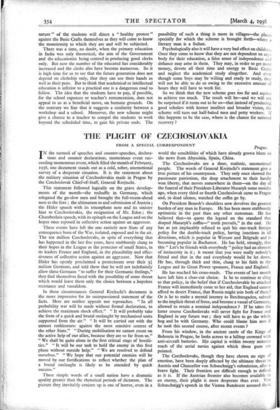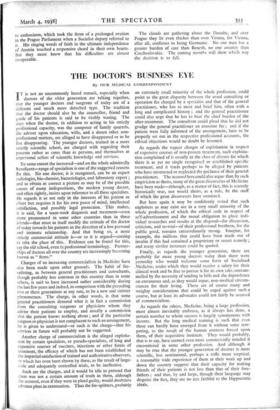THE PLIGHT OF CZECHOSLOVAKIA.
IN the turmoil of speeches and counter-speeches, declara- tions and counter declarations, momentous event suc- ceeding momentous event, which filled the month of February, 1938, one document stands out as a cold, sober, unemotional survey of a desperate situation. It is the statement about the military situation of Czechoslovakia made in Prague by the Czechoslovak Chief-of-Staff, General Krejtschi.
This statement followed logically on the grave develop- ments of the month—the reshuffle in Germany, which relegated the go-slow men and brought the full-steam-ahead men to the fore ; the ultimatum to and submission of Austria ; the Hitler speech with its triumphant note and its sinister hint to Czechoslovakia, the resignation of Mr. Eden ; the Chamberlain speech, with its epitaph on the League and on the hopes once reposed in collective action against an aggressor.
These events have left the one entirely new State of any consequence born of the War, isolated, exposed and in the air. The ten million Czechoslovaks, in spite of everything that has happened in the last five years, have stubbornly clung to their hopes in the League as the protector of small States, in its leaders France and England, in the plausibility and effec- tiveness of collective action against an aggressor. Now that Hitler has openly proclaimed a protectorate over their 31 million Germans, and told them that he will not indefinitely allow these Germans "to suffer for their Germanic feelings," they find themselves faced with the possibility of some threat which would leave them only the choice between a hopeless resistance and vassaldom.
In these circumstances General Krejtschi's document is the more impressive for its unimpassioned statement of the facts. Here are neither appeals nor reproaches. " In all probability war will be made without formal declaration, to achieve the maximum shock effect." " It will probably take the form of a quick and brutal onslaught by mechanised units supported from the air." " It will be carried out with the utmost ruthlessness against the most sensitive centres of the other State." "During mobilisation we cannot count on the active help of our allies, because they are so far from us." " We shall be quite alone in the first critical stage of hostili- ties." " It will be our task to hold the enemy in this first phase without outside help." " We are resolved to defend ourselves." " We hope that our potential enemies will be moved by our fortifications to reflect whether the plan of a brutal onslaught is likely to be attended by quick success."
These simple words of a small nation have a dramatic quality greater than the rhetorical periods of dictators. The picture they inevitably conjure up is one of horror, even in a world the sensibilities of which have already grown blunt on the news from Abyssinia, Spain, China.
The Czechoslovaks are a dour, realistic, unemotional people. The words of General Krejtschi's statement give a true picture of his countrymen. They only once showed the passionate patriotism, the deep attachment to their hardly won liberty, that moves somewhere in them—on the day of the funeral of their President-Liberator Masaryk some months ago, when every third or fourth Czechoslovak came to Prague and, in dead silence, watched the coffin go by.
On President Benesh's shoulders now devolves the greatest burden of any man in Europe. He has been more stubbornly optimistic in the past than any other statesman. He has believed that—to quote the legend on the standard that draped Masaryk's coffin—" truth prevails," in the end. He has as yet implacably refused to quit his one-track foreign policy for the double-track policy, having junctions in all directions, which is popular in Warsaw and Belgrade and is becoming popular in Bucharest. He has held, strongly, that this " Let's be friends with everybody " policy had an element of insincerity in it ; it meant that you were really nobody's friend and that in the end everybody would be let down. He has, through thick and thin, clung to his faith in the League and its Great Power sponsors, France and England.
He has reached his cross-roads. The events of last month have left him a clear-cut choice. Is he to continue to cling to that policy, in the belief that if Czechoslovakia be attacked France will immediately come to her aid, that England cannot afford to desert France, that Russia might join both of them? Or is he to make a mental journey to Berchtesgaden, submit to the implicit threat of force, and become a vassal of Germany, allowed to retain a nominal independence ? If he takes the latter course Czechoslovaks will never fight for France and England in any future war ; they will have to go the whole hog and be with Germany. Who could blame him now if he took this second course, after recent events ?
From his window, in the ancient castle of the Kings of Bohemia in Prague, he looks across to a hilltop crowned with anti-aircraft batteries. His capital is within twenty minutes reach of the aerial navies against which those guns are pointed.
The Czechoslovaks, though they have shown no sign of emotion, have been deeply affected by the ultimate threat to Austria and Chancellor von Schuschnigg's submission, after a brave fight. Their frontiers are difficult enough to defeni as it is. If the Austrian frontier also becomes available to an enemy, their plight is more desperate than ever. Vell Schuschnigg's speech in the Vienna Bundesrat aroused 111c7-1 to enthusiasm, which took the form of a prolonged ovation in the Prague Parliament when a Socialist deputy referred to it. His ringing words of faith in the ultimate independence of Austria touched a responsive chord in their own hearts. But they must know that his difficulties are almost insuperable. The clouds are gathering about the Danube, and over Prague they lie even thicker than over Vienna, for Vienna, after all, confesses to being Germanic. No one man has a greater burden of care than Benesh, no one country than Czechoslovakia. The coming months will show which way the decision is to fall.







































































 Previous page
Previous page